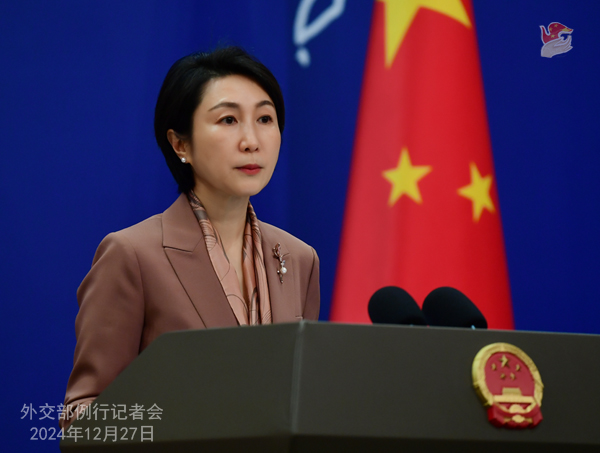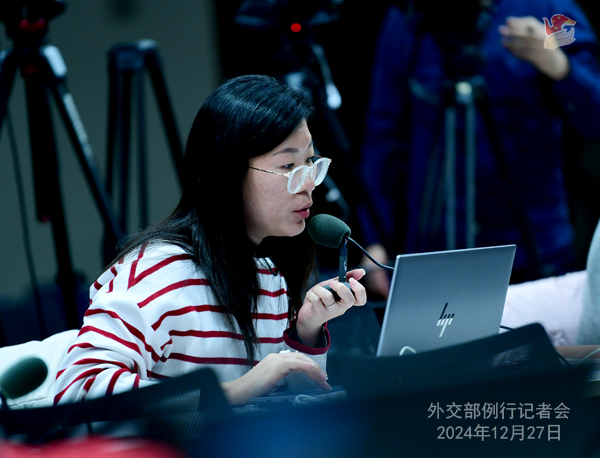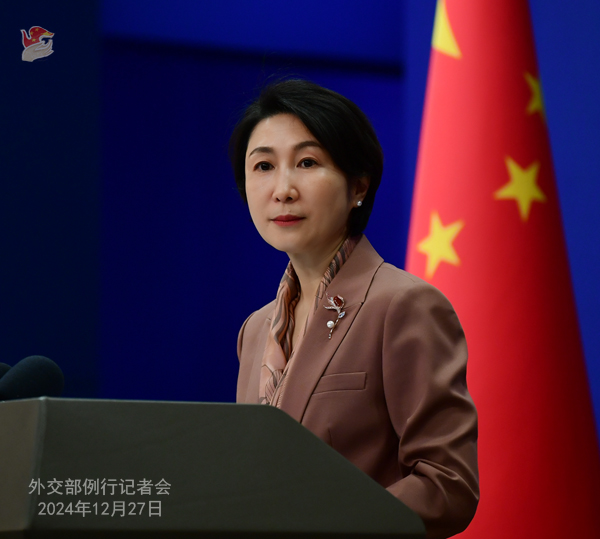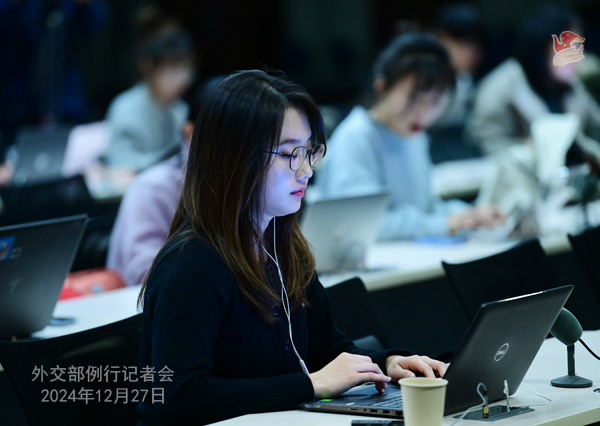
Minister of Foreign Affairs of Iran Seyyed Abbas Araghchi will visit China from December 27 to 28 at the invitation of the Chinese side.
Xinhua News Agency: The Ministry of Foreign Affairs announced on its website the decision to take countermeasures against seven US defense corporations and related senior executives. Do you have any further comment?
Mao Ning: Recently, the US has, once again, provided China’s Taiwan region with huge military aid and arms sales and its “National Defense Authorization Act for Fiscal Year 2025” contains negative articles on China. Such acts seriously violate the one-China principle and the three China-US joint communiqués, seriously interfere in China’s internal affairs, and seriously undermine China’s sovereignty and territorial integrity. In accordance with the provisions in the Law of the People’s Republic of China on Countering Foreign Sanctions, China decided to take countermeasures against seven US defense corporations and related senior executives.
Seeking “Taiwan independence” is bound to fail. What the US has done to assist the “Taiwan independence” attempt by arming Taiwan will only backfire. Its relevant act containing negative articles on China is filled with Cold War zero-sum mentality and ideological bias. Without factual basis, it plays up the “China threat” narrative, trumpets for military support to Taiwan and tries to find a pretext for increasing military expenditure and maintaining hegemony, which disrupts regional peace and stability.
We urge the US to abide by the one-China principle and the provisions in the three China-US joint communiqués, especially the August 17 Communiqué of 1982, immediately stop arming Taiwan in any form, view China’s development and China-US relationship objectively and rationally, not to implement these negative articles concerning China and stop wrong words and deeds that harm China’s interests. China will continue to take all measures necessary to firmly safeguard our sovereignty, security and development interests.
AFP: On Thursday, a spokesman for the US Department of State said that Hong Kong’s announcement of bounties against six democracy activists based overseas was “transnational repression.” Would the Foreign Ministry like to comment on this label?
Mao Ning: These so-called pro-democracy activists mentioned by the US have absconded overseas and long engaged in destabilizing activities to disrupt and undermine Hong Kong’s development and social stability. What they did gravely undermines national security and Hong Kong’s fundamental interests and has a serious impact on One Country, Two Systems which is a bottom line that must not be crossed. The Hong Kong police took law enforcement actions in accordance with the Law on Safeguarding National Security in Hong Kong and the Safeguarding National Security Ordinance. These are just acts that uphold the rule of law and meet people’s aspirations. They are also necessary acts to defend China’s sovereignty and security and legitimate acts to uphold long-term stability, development and prosperity in Hong Kong.
The extraterritorial application of the Law on Safeguarding National Security is in strict compliance with international law and the common practices of countries and regions across the world. The US overstretches the concept of national security and arbitrarily imposes illicit long-arm jurisdiction on the one hand, and has made unjustified criticism over Hong Kong police’s legitimate law enforcement activities on the other hand. This violates the spirit of the rule of law and fully exposes its hypocrisy and double standards. China deplores and firmly opposes this.
Hong Kong affairs are China’s internal affairs and there is no place for foreign interference. We call on the US to respect China’s sovereignty and Hong Kong’s rule of law and stop emboldening anti-China rioters.
PTI: Former Indian Prime Minister Mr. Manmohan Singh has passed away in Delhi yesterday. How do you see his legacy, especially in relation to India-China relations?
Mao Ning: Mr. Singh, a senior statesman and renowned economist, will be remembered for his vital contribution to closer China-India ties. As India’s Prime Minister, he oversaw the establishment of China-India strategic and cooperative partnership for peace and prosperity and the agreement on the political parameters and guiding principles for the settlement of the boundary question. We mourn for his passing and extend sincere condolences to his family and the government and people of India.
PTI: Yesterday, China announced the approval of the world’s largest dam at ecologically sensitive Himalaya region close to Indian LAC. The dam over Yarlung Zangpo River has raised a lot of concerns in the neighborhood, especially the enormity of it—it is supposed to be the largest dam in the world. Has China taken concerns of the riparian states like India and Bangladesh about the likely effects they feel about this particular project?
Mao Ning: China has always been responsible for the development of cross-border rivers. China’s hydropower development in the lower reaches of the Yarlung Zangbo River aims to speed up developing clean energy, and respond to climate change and extreme hydrological disasters. The hydropower development there has been studied in an in-depth way for decades, and safeguard measures have been taken for the security of the project and ecological environment protection. The project has no negative impact on the lower reaches. China will continue to maintain communication with countries at the lower reaches through existing channels, and step up cooperation on disaster prevention and relief for the benefit of the people by the river.

Reuters: The Russian Ambassador told RIA news agency today that Chinese leader will visit Russia next year. Could we confirm this news? And we would like to know if the plans for Chinese leader’s visit is made and when will that be.
Mao Ning: China and Russia are comprehensive strategic partners of coordination for a new era. Our two sides maintain close interactions at various levels.
Kyodo News: After the talks between the Chinese and Japanese foreign ministers on December 25, Chinese Foreign Ministry said in a readout that on historical issues, the Japanese side continues to uphold the position established in the “Murayama Statement,” expresses deep introspection and offers a heartfelt apology. Japanese Foreign Minister Takeshi Iwaya said in today’s press conference that what Chinese Foreign Ministry said was inaccurate. What he said at the foreign ministers’ talks was that Shigeru Ishiba’s cabinet stays committed to the statements of former prime ministers, including that by Murayama Tomiichi in 1995 and Shinzo Abe in 2015. The Japanese government lodged protests to China over the inaccuracy. What’s your comment?
Mao Ning: Several Japanese leaders once made clear their attitude on historical issues. Among them, Japan’s former Prime Minister Murayama Tomiichi issued an official statement on historical issues in 1995. He made a profound reflection on Japan’s colonial rule and aggression and expressed apologies to the victim countries of the war. As I know, the Japanese side expressed their commitment to the above-mentioned position during the talks with the Chinese Foreign Minister. Having a right perception of and attitude towards its history of militarist aggression is an important prerequisite for Japan to win the trust of the international community, especially its Asian neighbors. Next year marks the 80th anniversary of the victory of the Chinese People’s War of Resistance against Japanese Aggression and the World Anti-Fascist War. We hope that Japan will once again show its resolve to peace and development, and work with China to follow the spirit of facing history squarely and shaping a brighter future and advance the sound and steady development of China-Japan relations.
CCTV: It’s reported that according to a latest public opinion poll recently released by a Malaysian opinion research firm, Malaysians’ favorability towards China has increased significantly. Many of them are positive on China’s development. Seventy-seven percent of respondents express positive sentiments about China. Eighty-four percent believe Malaysia-China relations are improving. What’s China’s comment?
Mao Ning: We have taken notice of relevant reports. China and Malaysia are close neighbors across the sea. The two peoples enjoy time-honored traditional friendship. Good-neighborliness and friendship, mutual benefit, and solidarity and collaboration have been the underlying feature of bilateral relations. This year, the two countries celebrated the 50th anniversary of the establishment of China-Malaysia diplomatic relations, and the Year of China-Malaysia Friendship. We’ve written another new chapter in building a China-Malaysia community with a shared future.
Friendly ties between China and Malaysia is an epitome of the robust growth of relations between China and neighboring countries. In recent years, China and neighboring countries have enjoyed deepening friendship and mutual trust, increasingly entwined interests, and fruitful practical cooperation. This has injected stability and certainty into a complex world landscape, greatly contributed to the lasting peace and stability and fast economic growth in the region, and benefited people from regional countries, which receives wide support and recognition. China stands ready to continue acting on the principle of amity, sincerity, mutual benefit and inclusiveness and work with neighboring countries to build an Asian home, advance the building of an Asian community with a shared future, and inject more positive energy into peace, stability, development and prosperity in the region and the wider world.
Reuters: There was another US State Department statement this morning, and this one is regarding the Chinese sanctions on Canadian institutions. The US called on China to “cease acts of transnational repression in relation to these sanctions on Canadian institutions and individuals over the Xinjiang and Tibet issues.” How does the Foreign Ministry respond to this?
Mao Ning: In response to Canada’s sanctions on Chinese personnel citing so-called human rights violations, China has taken countermeasures in accordance with the law. This is completely justified and legitimate. We call on relevant country to face up to its own problems and stop political manipulation in the name of human rights issues.

NHK: We have learned that a suspect has been indicted for the knife attack on a Japanese school bus in Suzhou in June this year, and another suspect was indicted for the case that happened in Shenzhen in September. What are the charges? Can you share more details, such as the motives of the suspects?
Mao Ning: As I have learned, regarding the case in Suzhou, Chinese procuratorial authorities filed a public prosecution on November 29. For more details of this case, I’d refer you to competent authorities.
On the other case, I have no further information at hand at the moment.
Kyodo News: According to media reports, Member of the Political Bureau of the CPC Central Committee and Foreign Minister Wang Yi will visit Japan in February next year and have talks with Japanese Foreign Minister Takeshi Iwaya, and the two sides are in consultations on the agenda. Can you confirm that? How do you view the current China-Japan relations? Do you have any expectations for Foreign Minister Wang Yi’s visit to Japan?
Mao Ning: On Foreign Minister Wang Yi’s visit to Japan, I have no information to share. Let me say that the just concluded talks between the Chinese and Japanese foreign ministers, both sides agreed to maintain exchanges and cooperation at all levels and through all channels.
China and Japan are close neighbors. Bilateral relations are at a critical juncture of improvement and development. As Foreign Minister Wang Yi said, in accordance with the principles and directions stipulated in the four political documents between China and Japan, the two countries should be cooperative partners rather than threats to each other and jointly advance the sound and steady development of China-Japan relations.
AFP: Incoming US President Donald Trump has threatened to take control of the Panama Canal claiming that China is involved in its operations and that there are Chinese soldiers there. Does the Foreign Ministry have comment on Trump’s claims? And does China deny that it is interfering with operations and that it has soldiers at the canal?
Mao Ning: I answered relevant question several days ago, which you may refer to. Panama’s President Jose Raul Mulino stressed that the Canal has no control, direct or indirect, from any power. China will as always respect Panama’s sovereignty over the Canal and recognize the Canal as a permanently neutral international waterway.
Reuters: Local labor authorities in Brazil said that Chinese workers found at a construction site of a factory owned by car maker BYD were victims of international human trafficking. BYD and contractor Jinjiang Group have agreed to assist and house these workers in hotels until a deal to end their contracts is reached. Does the Ministry have any response to this?
Mao Ning: We noted the reports. We are in communication with the Brazilian side and learning what actually happened. Let me say that the Chinese government attaches great importance to protecting the lawful rights and interests of workers and has all along asked our companies to abide by laws and regulations in their operation.
